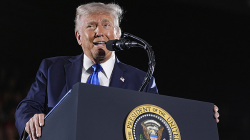China Implements Expansionary Fiscal Policy Amid Anticipated Decline in Exports
In the context of "de-globalization," China's economy may face a long-term trend of declining exports. To address this challenge, it is crucial for China’s production model to swiftly shift from focusing on mid- to low-end industrial goods for the global market to offering products and services that cater to domestic needs, particularly in areas related to people's livelihoods and technological innovation. Additionally, enhancing domestic demand to offset the reduction in external demand has emerged as a vital strategy for maintaining stable economic growth.

**Macroeconomic Context of Expansionary Fiscal Policy**
China is facing the consequences of "de-globalization," which may result in a prolonged decline in exports. It is crucial for the country’s production model to transition swiftly from providing mid- to low-end industrial goods for the global market to focusing on products and services that enhance people’s livelihoods and promote technological innovation within the domestic market. Additionally, it has become vital to stimulate domestic demand to offset falling external demand and maintain stable economic growth.
**Critical Role of Expansionary Fiscal Policy**
As China's international balance of payments gradually moves from a surplus to an equilibrium, it is only through fiscal expenditures surpassing revenues or incurring deficits that residents and businesses can achieve a net surplus. Consequently, fiscal expansion, which includes increasing the fiscal deficit and the government's leverage, is essential for fostering sustainable economic growth. This is particularly important given the pressure on the balance sheets of residents, businesses, and local governments, alongside ineffective monetary policy transmission and stagnant savings that fail to support investment. The central government can issue treasury bonds to expand its balance sheet, counteracting the contraction faced by related sectors, thus providing an effective approach for countercyclical adjustments.
**Key Areas for Allocation of Fiscal Funds**
Fiscal funds play a significant role in revitalizing government investment growth, whether utilized for resolving debt or for transfer payments. Their effectiveness in stimulating the economy is particularly notable when directed towards initiatives such as trade-ins or cash subsidies that encourage consumption. Furthermore, ensuring high-quality supply is essential for fostering demand upgrades and maintaining demand security. Amid de-globalization, the government must take responsibility for advancing technological pathways, which are currently impeded. This can be achieved through strategic design and financial resource allocation to promote "independent innovation" in key sectors, while also facilitating broader technological advancements across related industrial chains. Additionally, in light of global instability and the shortcomings of market-driven resource allocation, it is critical for China to use fiscal funds to restructure grain and energy supply channels and related resource supply chains to ensure food and energy security.
Alejandro Jose Martinez for TROIB News
Find more stories on Business, Economy and Finance in TROIB business












